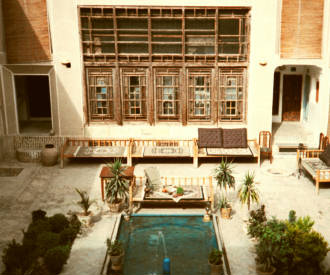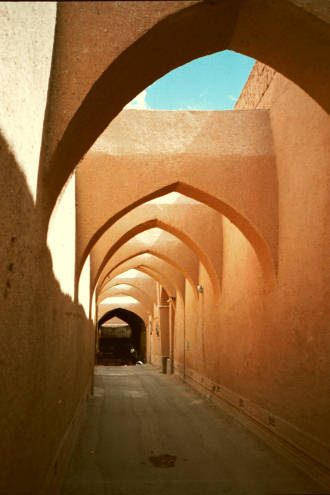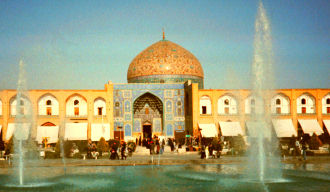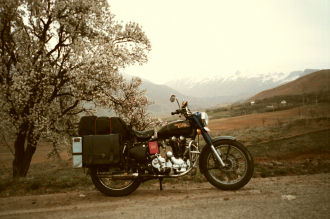Northern Iran
Esfahan is widely touted as the most pleasant city in Iran. So it undoubtedly is, but if the faint praise sounds damning, so be it.In fact, so be it for Iran in general. It's all just so pleasant. In Esfahan hardly a street is without a wide central pedestrian reservation of trees, fountains and flowers. Many of the buildings are attractive, while the city centre is more park than city. But it's somehow too civilised. I keep warning myself against making spurious comparisons, but in a curious way Iran reminds me of Chile. Both are modern, well-kept, pleasant and innocuous, yet are held back from full first-world status by struggling economies (although I'd love to know what Iran does with all those oil dollars). Sometimes I just miss the frenzy, the visceral intensity, of India. I suppose anywhere would feel tame after that.
I shouldn't be too harsh. On its own terms, Iran is a great place. It certainly has the potential to become a major tourist destination, if the world comes to realise the true nature of the country (and if visas become much easier to obtain). As it is, there aren't many tourists at the best of times, and naturally next to none now. After a few days in Esfahan, the foreigner count reached double figures, but elsewhere I've seen no more than four, and usually none.
My stay in Yazd was extended by a couple of days on account of a hotel that I discovered soon after my arrival there. It was immediately apparent that it was the hotel of my dreams: an old, renovated merchant's house, exemplifying for me the Platonic ideal of residential architecture. The entrance is within the covered bazaar, along a long passageway lit by lanterns. Within, the fourteen rooms are on two levels, set around a courtyard of such understated elegance that I was instantly hooked. The centre of the courtyard has a blue fish pond with a fountain, around it are arrayed deep benches for reclining on the Persian carpets and cushions that bedeck them, and the two dining rooms are captivating in their decoration. I suggest considering a trip to Iran simply to stay at this hotel: the Malek-o-Tojjar

The peaceful haven of the Malek
Unfortunately it was well out of my price range. However, two days of cajoling, flattery and pleading brought an offer of the Iranian price of under a tenner a night. Still expensive by the standards of my budget but outstanding value for money, so I moved in. On my first night there, I was almost delirious with happiness in the calm and beautiful surroundings, a feeling which barely abated throughout the second day when I made forays out into the peaceful mud alleyways. Given enough books to read, I could almost have stayed there indefinitely.

The streets of old Yazd
To some extent, Esfahan suffered by comparison after my idyllic experience of Yazd. Still, it had its moments. Looking out, from the terrace of a teahouse, across the floodlit domes and palace of the massive Emam Square, its claim to be one of the great squares of the world can hardly be denied. There was an anti-war demonstration in the square after Friday prayers, with much burning of flags and effigies. The chants were repeated for America, Inglish and, for good measure, Israel. I wasn't sure whether they were preceded by death to, but it was translated for me as down with.

Esfahan - just too pleasant?
However, all is not what it seems in Iran. It seems that most of the demonstrators were government employees, and were obliged to take part. I've encountered a wide range of views from Iranians about the regime here. At one extreme, one young man told me it was the best democracy in the world. The majority of people, though, have expressed considerable dissatisfaction, and I was initially surprised to find that many even advocate military action here by the US to rid them of the present government - a wish that they always estimate to be shared by over fifty percent of the population.
There have been some concessions towards greater freedom in recent years: playing music in public is now allowed, as is dancing (at least at weddings) and playing chess. Card games are still banned, the media is heavily censored, and the elections rigged. For the women, there is a bit more latitude in their manner of dress. Now, they can get away with make-up and some fringe showing under their headscarf, and some even sport long hair hanging below it. However, reforms promised by President Khatami have not really materialised, and opinion is divided as to whether this is simply because of opposition by the clerics, who ultimately hold the power, or whether Khatami is as bad as all the other leaders. Pictures of the ayatollahs Khomeini and Khameini are everywhere.
Nevertheless, the spirit of the people remains undented. Iranian hospitality continues to astound me. I recently read an account that re-traced the motorcycle travels through South America of the young Che Guevara, who shamelessly milked people's generosity for all it was worth. Had he come to Iran, he'd have had no trouble existing without money. Frequently payment will be refused - in a cafe or by mechanics, for example, or patisseries or fruit sellers will wave you away with your bag of biscuits or fresh dates. Particularly outstanding instances of recent generosity include the lunch I had in the home of the family of an Armenian girl who befriended me in Esfahan. In Qazvin, further north, I was just finishing a meal in a restaurant when the place suddenly started to fill up. It transpired that it was for a meal in memory of a prominent local man who had recently died. His family not only insisted on paying for my meal, but it was all I could do to avoid being forced to eat another as I chatted to them! Only today, I was bought lunch by a friendly welder.
Offers to stay in people's homes have also been made several times, although they haven't fitted in with my plans. On one occasion, I was flagged down by an overtaking car. I hadn't even met the family, but they had seen me sleeping on the floor of a restaurant in a small village, and wanted to offer me a more comfortable night's rest in Tehran! However, Tehran sounds like a city to avoid, so I did, bypassing it to Qazvin. From here I spent a couple of days in the Alborz mountains - fantastic biking territory, with the roads snaking along an attractive valley.

Blossom in the Alborz mountains
It was a welcome relief to see rural parts of Iran; in the south, there simply isn't any countryside, since there's nothing but desert between the towns, but in the north the climate grudgingly allows some agriculture. I visited a couple of the castles of the Assassins, an eleventh century cult whose penchant for political killings gave rise to the term. The derivation of the word is interesting, supposedly from their local name of Hashishiyun, since they recruited followers by doping them up and bringing them to their mountain retreats. There they were seduced by fair maidens in beautiful gardens, all with the benefit of more hashish. Once thoroughly inculcated into this earthly paradise, they were sent off to perform their killings, with success the only ticket back!
After this, I found myself very indecisive about where to go next. Finally I realised that I had probably seen the best of Iran, so I am now heading towards the Turkish border. A couple of towns and a major oil leak later, I have made it to Tabriz. When the weather is decent, I'll proceed to Bazargan, which is the more northerly of the two crossing points. The one further south isn't sensible to use at the moment since the region on the other side, in the south-east of Turkey, is currently closed to foreigners. They're rather sensitive about their Kurds.
